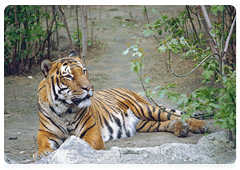MULTIMEDIA
 +
+
The Amur tiger is the largest member of a subspecies of tigers. It can be as long as two metres. The adult tiger usually weighs up to 300 kilogrammes
 +
+
The tiger’s coat is beautifully coloured: it has dark horizontal stripes against an orange-brown background on its back and both sides. It is commonly believed that the striped pattern is unique for each tiger
 +
+
The tiger is a top carnivore in the food chain living in a unique ecosystem, the Ussuri taiga. The condition of tiger populations is an indicator of the state of the environment in the entire Far East
 +
+
The tigers greet one another with special sounds that they make by vigorously exhaling air through the nose and mouth
 +
+
Friendly behavior for the tigers may also be marked by the animals touching their heads or faces or rubbing their sides
 +
+
Tigers are polygamous: one male tiger can have one to three females living with it on its territory. The appearance of a rival on its territory may end in fighting
 +
+
The tiger is a solitary territorial predator, which is typical for the majority of big cats. The adult tiger usually stays within a particular range of land which it guards from intruders
 +
+
The tiger is a quiet animal. Some zoologists who have studied the animal for many years have not heard the tiger roar even once
 +
+
If the tiger is irritated, it growls hoarsely; when it is angry, it makes a characteristic “cough”
 +
+
Amur tigers not only hunt but also catch fish: they catch fish in the shallow waters of highland rivers during spawning season
 +
+
The tiger can eat up to 30 kilogrammes of food in one sitting and its daily ration is nine to ten kilogrammes of meat
 +
+
The tiger marks its territory in a special way. It usually does this with scent marks: the tiger splashes urine on trees or rocks. Sometimes it scratches the ground in places that it has marked
 +
+
When food is plentiful, tigers quickly get fat, with their hypodermic fat often growing five or six centimetres thick. Because of this, tigers can easily go without food for a week and even more between successful hunts









 ABOUT THE PROGRAMME
ABOUT THE PROGRAMME
 AMUR TIGER: LIFE, BEHAVIOUR AND MORE
AMUR TIGER: LIFE, BEHAVIOUR AND MORE
 AMUR TIGER RESEARCH: A HISTORY
AMUR TIGER RESEARCH: A HISTORY
 VLADIMIR PUTIN'S VISIT
VLADIMIR PUTIN'S VISIT
 NEWS
NEWS
 MULTIMEDIA
MULTIMEDIA